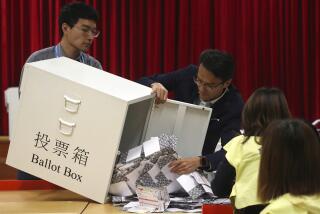Beijing-Style Democracy
- Share via
Beijing continues to make good on its promise to eliminate democratic measures that the British instituted in Hong Kong in 1995. First, when it reassumed sovereignty over Hong Kong last July, China gave the boot to the legislature elected under British rule. Now members of Hong Kong’s new Provisional Legislature, all appointed with Beijing’s blessing, have approved plans to sharply cut back the number of eligible voters in the first election under Chinese rule, set for next May.
The electoral change is Beijing’s latest interpretation of its “one China, two systems” plan for Hong Kong. The rollback was expected but nevertheless is disappointing. Beijing had claimed that the 1995 elections violated the Sino-British agreement for the return of Hong Kong. The party led by Martin Lee, a vocal critic of the Beijing regime, won the largest bloc of seats in that election, Hong Kong’s first to freely select the entire legislature (some members had previously been British-appointed).
But Lee’s victory was short-lived. Beijing named Tung Chee-hwa, a shipping tycoon, to oversee the Hong Kong transition to Chinese rule. It was Tung who introduced the electoral changes, which were approved by the Provisional Legislature last weekend in an 18-hour debate.
The most dramatic change is in who gets to vote. In the 1995 election, under British rule, 2.7 million residents were able to vote. According to the new rules, Hong Kong will use a complex proportional representation system to prevent any one party from dominating the 60-seat legislature. Under Beijing’s scheme, 20 seats will be filled at large by all voters and 30 seats will go to business representatives elected by a smaller number, 180,000 people. The remaining 10 seats will be filled by an 800-member electoral committee of pro-Beijing and business interests.
The new electoral rules make clear that Beijing intends to make its influence felt in the legislature, both in numbers and policies. None of the changes offer fresh air for democracy. The May elections will be watched closely, for they may mark the end of the touted “one-China, two-systems” policy.
More to Read
Sign up for Essential California
The most important California stories and recommendations in your inbox every morning.
You may occasionally receive promotional content from the Los Angeles Times.










